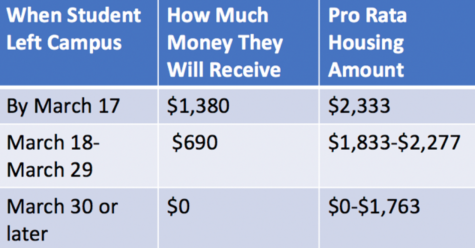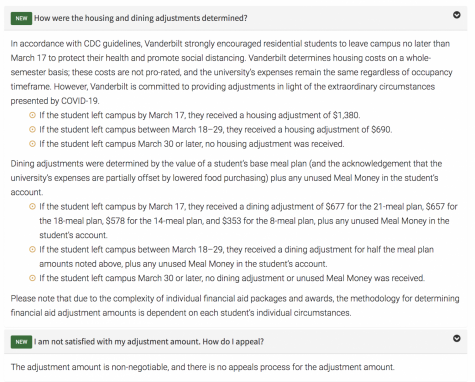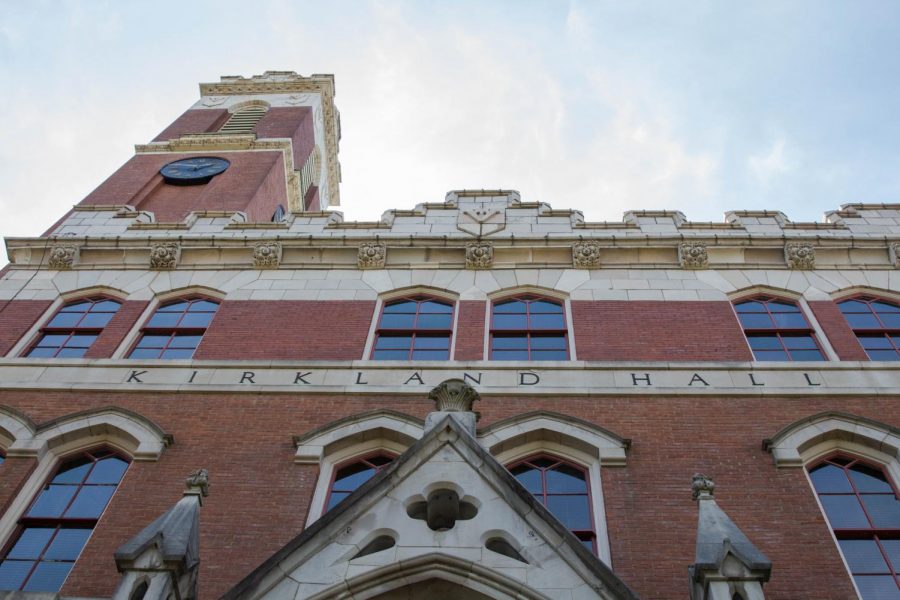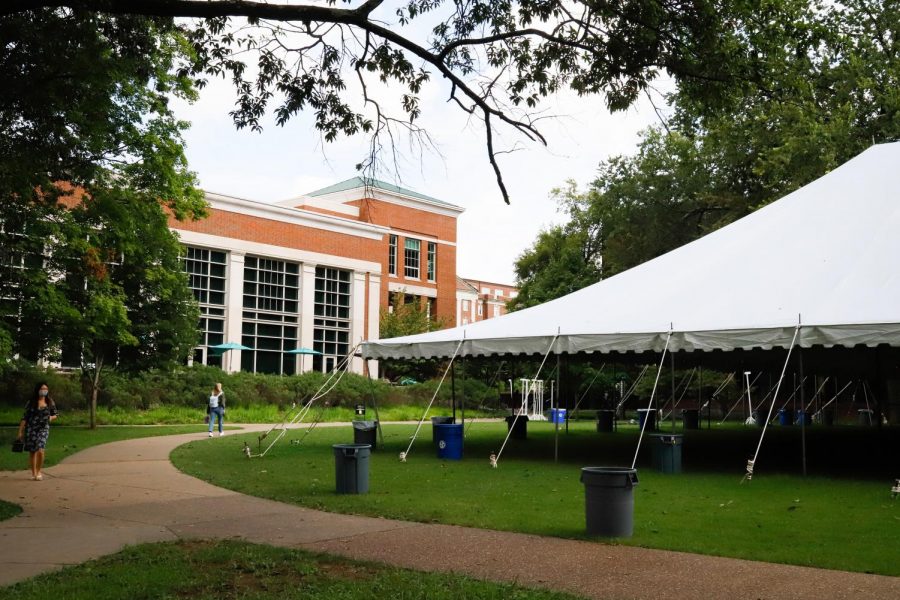Following an announcement earlier this month that the university would be refunding students in part for room and board, Vanderbilt released numbers in the FAQ portion of its coronavirus website.
Students can expect to receive between $0 and $2057 in housing and dining refunds in addition to their remaining Meal Money balance, depending on when they left campus and what meal plan they have, according to Vanderbilt’s newly-updated Coronavirus FAQ. Students who left campus by March 17 will receive a housing adjustment of $1,380, students who left between March 18 and 29 will receive $690 and students who left March 30 or later will receive $0.
No email was sent to students to inform them that the website was updated with this information.
These costs are not prorated, Vanderbilt said, stating on the Coronavirus FAQ page that “the university’s expenses remain the same regardless of occupancy timeframe.” Vanderbilt has not yet responded to a request to elaborate on which expenses remain the same while most students are moved out, or how the university will handle other fees paid by students.
VSG Senate passed a resolution March 18 calling on Vanderbilt to provide pro rata, or proportional, refunds for housing, dining, residential experience fees and student services fees. Since Vanderbilt released the adjustment amount April 5, the five co-sponsors of the VSG Senate resolution called the offered housing refund “unacceptably low.”
The group, comprised of Hank senator Bryce Collings, Peabody senator Kate Petosa, Lewis House senator Courtney Kim, A&S senator Will Fritzler and Deputy Speaker Robert Lusk, asserted that “each student is still owed approximately $1,000 in additional refunds” based on their pro rata calculation.
Housing refunds
Vanderbilt’s housing rate is $5,554 per semester. If a student remained in their residence hall until March 17, they spent about 58 percent of the semester on campus. A prorated housing refund for the remainder of the semester would have meant $2,333 in student accounts, almost $1,000 greater than the $1,380 offered for students who left by this date.
Students who stayed on campus up to 12 days past March 17 will also receive significantly less than the prorated housing amount. Students who remained until March 18 through 29 spent between 59 percent and 67 percent of the semester on campus. A pro rata housing refund would total between $1833 and $2,277 while this group of students was offered $690 — an $1,100 discrepancy between the offered refund and a pro rata refund. Students who stayed past March 29 do not qualify for a refund at all.

This chart lists how much of a housing adjustment Vanderbilt is offering by departure date. The chart compares the amount a student is going to receive per the university statement, listed in the middle column, to the pro rata amount, or the proportional cost of housing a student for that period of time.
Emory University and Northwestern University have both promised students prorated refunds of unused housing and dining costs along with certain fees, even for students on financial aid. Brown University is offering prorated room and board refunds, but stated it will be based on each family’s contribution to cost of attendance.
How financial aid will impact Vanderbilt’s refunds are unclear, as Vanderbilt’s FAQ states “the methodology for determining financial aid adjustment amounts is dependent on each student’s individual circumstances.” Vanderbilt has not yet responded to a request for clarification.
As part of this adjustment, students will be refunded no portion of the Student Service Fee, previously called the Activity and Rec Fee, which was $635 this year, or the Residential Experience Fee. The Residential Experience Fee was $352.50 this year and levied upon students who live in residential colleges in order to fund programming in Warren, Moore and E. Bronson Ingram Residential Colleges.
“We nonetheless believe that undergraduate students should not be required to pay for services that they no longer have the option of utilizing,” a section of the VSG resolution read.
Dining refunds
However, the co-sponsors of the VSG resolution calling for prorated refunds stated that they are satisfied with the dining refund. Although it’s not the pro rata amount the resolution requested, they said they were grateful that Vanderbilt honored their request to pay the dining staff through the end of the semester, and understand that there are costs associated with that.
Meal plans, which are mandatory for on-campus students, range from $3,470 for seniors to $5,866 for first years. Students can also have up to $325 in a meal money account. Any remaining money within that account will be refunded to students in full. At least one student reported that they asked Vanderbilt about a refund for 20 flex meals they had purchased before spring break, roughly $200 worth, and said Vanderbilt responded that the adjustments are not for flex meals.
Likewise, a dining adjustment for a first-year student who left campus by March 17 will equal $677. If this student had $150 left in their Meal Money account, roughly half of a first-year’s initial Meal Money, they would be refunded this value in addition to their meal plan adjustment and receive a $827 credit in their account. A pro rata adjustment for the remaining 42 percent of the semester after March 17 would equal $1,231, roughly $400 more than the adjustment.
The VSG Senate co-sponsors noted that unlike dining staff, Residential Advisors will not be paid for the remainder of the year. They said that housing is a service that students pay for, and are not receiving, and therefore they don’t believe students “should be obligated to pay for a service they did not receive.”
“We respectfully implore the University to provide expeditious explanation and remediation for the discrepancy between what students are owed and what they have been refunded,” the co-sponsors said in a joint statement to The Hustler.
Vanderbilt’s Coronavirus FAQ, however, states that the refund is final.
“The adjustment amount is non-negotiable, and there is no appeals process for the adjustment amount,” the FAQ reads.













Ashton • Apr 7, 2020 at 11:25 am CDT
Think it’s a bit hypocritical for VSG to get angry about how the housing arrangements weren’t refunded pro rata, but is completely content with the dining adjustments (also not refunded pro rata).
I understand that VSG has been advocating for dining workers’ equal pay, but there are other workers, other than dining workers, who are paid from the housing bill. They are the ones who keep the dorms in shape (janitors, security staff, etc.) that also probably need Vanderbilt to pay them.
Either be pro pro rata adjustments, or pro paying workers until the end of the semester. Can’t discriminate workers based on where they work! Dining workers = housing workers.